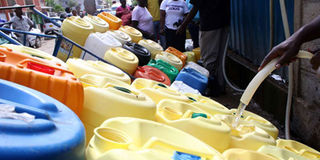Nairobi MCAs want illegal boreholes closed, drilling controlled

Residents of Tenor estate in Nairobi fetch water from a borehole amid a water shortage on January 30, 2016. PHOTO | JEFF ANGOTE | NATION MEDIA GROUP
What you need to know:
- They want City Hall to carry out an audit of all boreholes in the capital and stop use of those drilled in road reserves and along pipes of the Nairobi City Water and Sewerage Company (NCWSC).
- Mihang’o MCA Paul Kados said there are over 3,000 commercial boreholes in Nairobi and that more are drilled everyday so regulation is necessary.
- Appearing before the Water committee last Thursday, Nairobi's Environment and Water executive Vesca Kangogo said the county cannot fully control the mushrooming of commercial boreholes as its "hands are tied".
- City Hall Director of Water, Sanitation and Energy, Mr Mario Kainga, said only 20 commercial boreholes have been approved by the county government since Finance Bill, 2018 was signed into law.
Nairobi members of county assembly have demanded closure of all commercial boreholes drilled without the county's approval, saying most of it is unfit for human consumption.
They want City Hall to carry out an audit of all boreholes in the capital and stop use of those drilled in road reserves and along pipes of the Nairobi City Water and Sewerage Company (NCWSC).
Mihang’o MCA Paul Kados decried the mushrooming of commercial boreholes across the city, blaming this for water shortages.
He claimed business people collude with officials at the (NCWSC), resulting in rationing as they make a killing off residents desperate for the commodity.
“Most owners of commercial boreholes are in business and are the cause of lack of water in Nairobi. A friend who lives in Karen has 20 boreholes in Kayole," said the chair of the assembly's water committee.
"He is making a kill there selling water by competing with the company."
HIGH PRICES
Mr Kados said there are over 3,000 commercial boreholes in Nairobi and that more are drilled everyday so regulation is necessary.
“We do not need commercial boreholes where there are Nairobi Water pipes. In Mihang’o Ward alone, we have over 200 boreholes,” he said.
Kware MCA Rose Kula complained that in Nyagathugu, every plot has a commercial borehole with water drawn by vendors who sell it at exorbitant prices.
“What are officers at the sub-county level doing while all this is happening? A 20-litre jerrican is going for as much as Sh50."
Umoja I MCA Mark Mugambi said that in Umoja Innercore, almost all plots have boreholes.
While adding that up to five adjacent plots have their own boreholes, she noted the need for controls.
"HANDS TIED"
Appearing before the Water committee last Thursday, Nairobi's Environment and Water executive Vesca Kangogo said the county cannot fully control the mushrooming of commercial boreholes as its "hands are tied".
Ms Kangogo further said the county lacks a clear role in the drilling of the water sources and that the buck stops with the national government, through agencies such as the Water Resources Management Authority (WARMA) and the National Environment Management Authority (NEMA).
She explained that approval to dig a borehole is granted by Warma and Nema, which ask for ownership documents such as the LR number and title deed for the location.
“The work of the county is only to give the ‘no objection’ document after approvals by Warma and Nema. They (Warma) do not communicate their findings to us so that we can take responsibility,” she said.
POOR QUALITY
The NSWSC's Managing Director Nahashon Muguna said fluorine levels are very high for most boreholes in Nairobi, meaning the water is of poor quality, hence bad for human consumption.
The fluoride levels for boreholes in Eastlands are "extremely high", at over 15mm per litre against the required 0.5 mm per litre, Mr Muguna said.
Treating the water through reverse osmosis is also expensive.
“You can only know the quality of water after it has been tested. Drilling is done and water is drawn and taken for testing," he said.
"This is why we have not taken over most government-drilled boreholes ... the water from them is of poor quality."
Mr Muguna further noted that the NCWSC does not get money from the drilling of boreholes despite being the only approved undertaker in the capital. The approval fee goes to Warma.
HARMONISATION
City Hall Director of Water, Sanitation and Energy, Mr Mario Kainga, said only 20 commercial boreholes have been approved by the county government since Finance Bill, 2018 was signed into law.
He said Nairobi Water can only say whether or not a borehole is needed by sending officers to the ground for inspections.
Warma is in control as it grants approvals as mandated under Water Act, 2016, he also noted.
“We water experts can object but experts such as road and urban planners will say 'yes', making it hard to control the proliferation of these boreholes," he said.
"We need harmonisation of duplicated roles to have a centralised point of approval."





